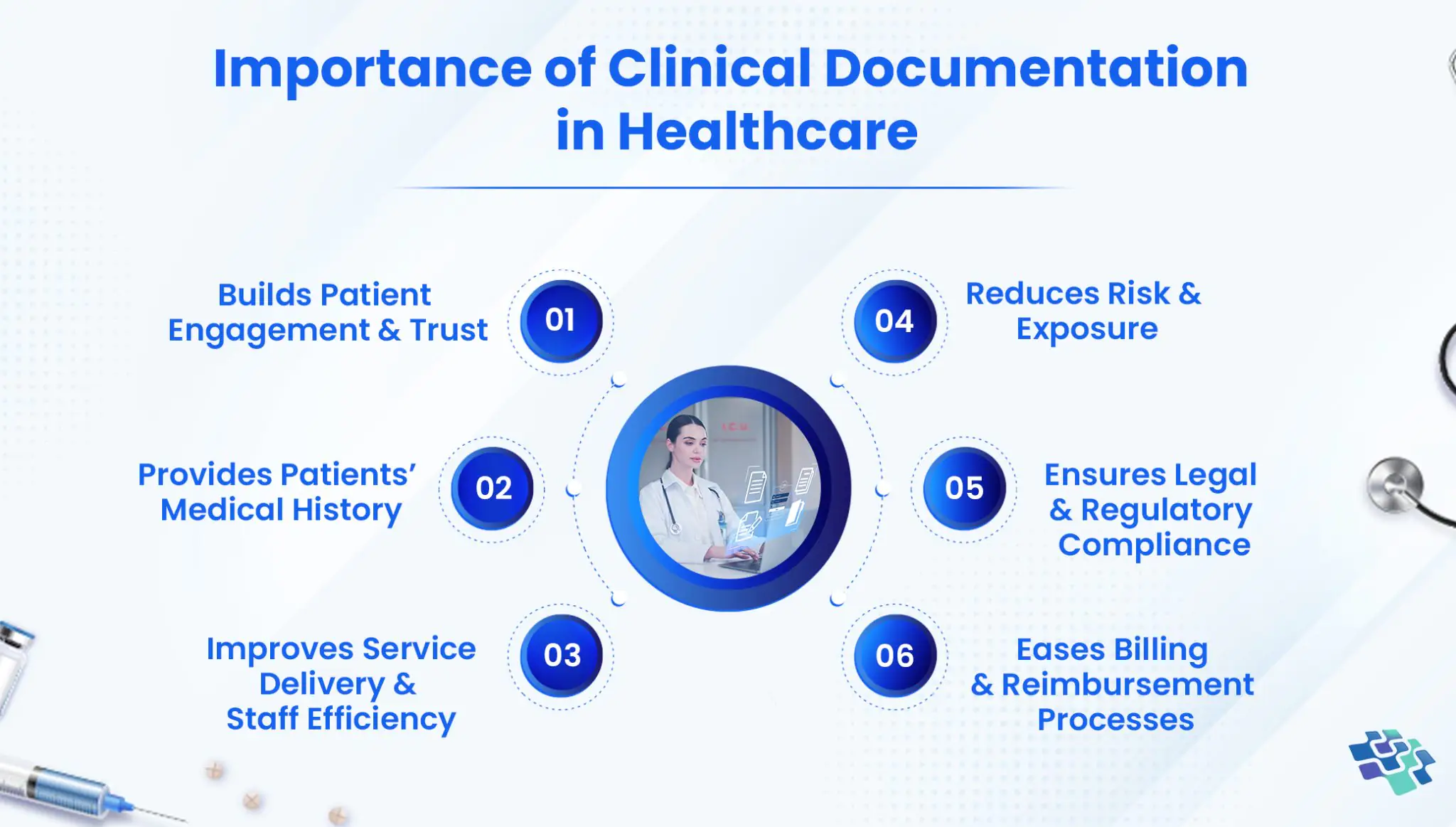Importance of Clinical Documentation in Healthcare
Furthermore, it becomes even more challenging when medical records lack precision, specificity, or clarity—often because of missing or insufficient information. Missing information in inadequate documentation frequently leads to increased readmission rates, longer lengths of stay (LOS), higher expenses, more harm indicators, and prescription errors. Improved communication between clinicians is facilitated by better documentation, which also helps ensure that the diagnosis and treatments are clear.
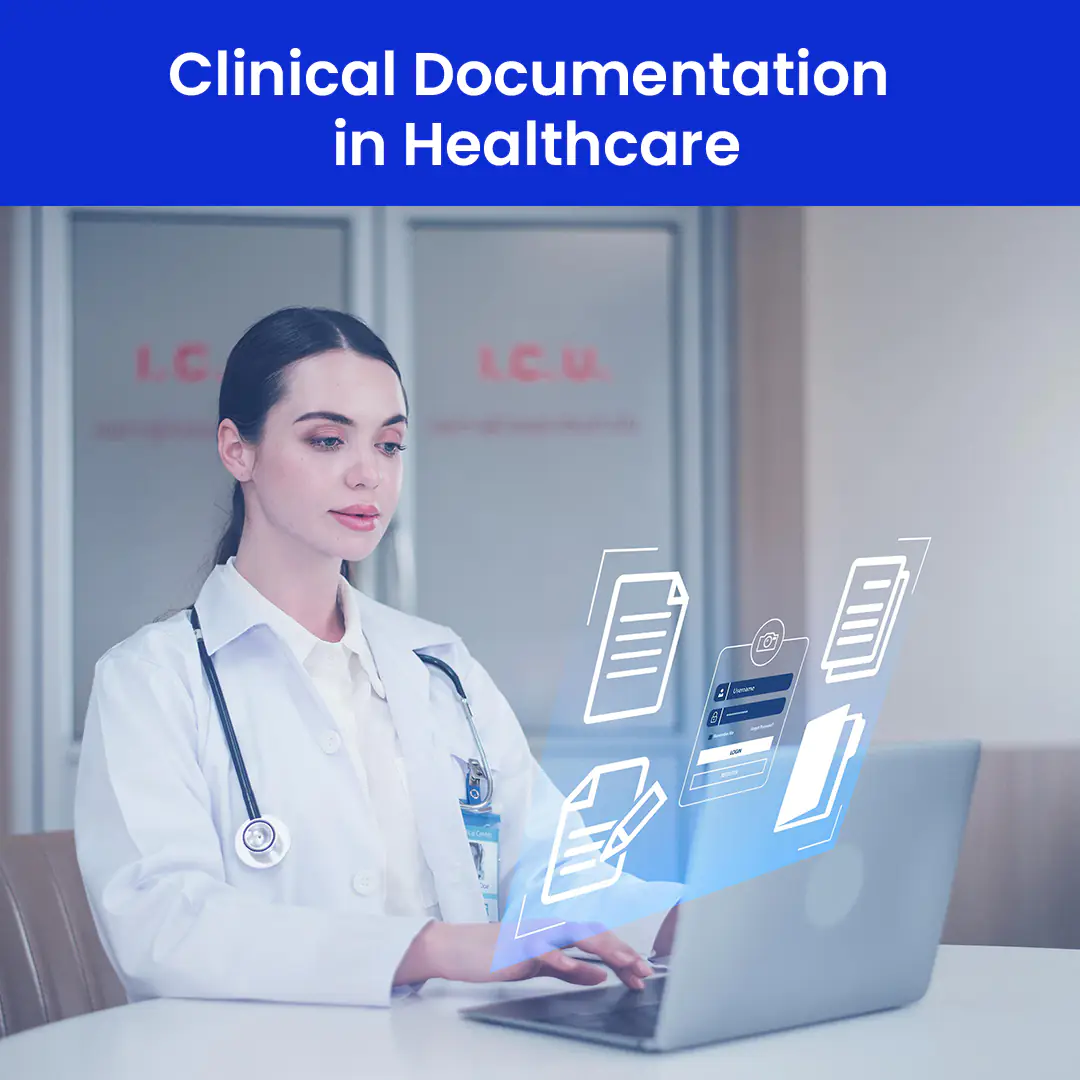
Burdened by Time-Consuming Data Entry? Automate Workflows with Our Advanced Digital Health Software Development Services!

“Documenting routine practices is essential for the continuity of patient care, legal defense, reimbursement, communication among healthcare professionals, and better patient diagnoses and treatments. Maintaining routine practice is part of the health professional obligation”– NCBI
What is Clinical Documentation?
Clinical documentation software creates an exhaustive record of all medical procedures, trials, or clinical examinations that a patient has had. To appropriately represent diagnoses and the extent of services provided in these records, accuracy, completeness, and dependability are essential. Why is documentation crucial in the medical field? It serves as a reference and proof of care continuity as a medical record. Here are some ways that it helps both patients and clinicians at every stage:
- Before Care: Gives information on a patient’s past medical history, current ailments, and therapies received.
- Enables treatment strategies to be informed by each patient’s individual profile.
- During Care: When needed, it offers access to data and real-time reference.
-
- Enables therapeutic modifications as the patient’s condition changes.
- Post Care: Minimizes denials and ensures proper compensation.
-
- Allows for an extensive assessment of treatments that have been put into place.
Challenges & Issues Related to Inadequate Documentation
Because it’s so important to deliver high-quality healthcare, both the patient and the practitioner may face several difficulties if proper paperwork is not maintained. From the perspective of the patient, a clinician who neglects to keep their medical records may cause
Consequences Of Current Care-Seeking Behavior Patterns
- One of their medical records, either now or in the future.
- An undefined course of treatment on how to handle their illness moving ahead.
- Repetitive explanations of their medical history cause annoyance and discontent.
From the perspective of the provider, poor documentation may result in:
- Late payments.
- Declined claims.
- Missed chances for more income, including unbilled services that were provided but never recorded.
Although these issues mostly impact patient safety and provider profitability, they can also put a financial strain on the patient. Poor clinical documentation also increases healthcare expenses for the
consumer because the patient will be responsible for paying any claims that their insurer has rejected. These claims would have been accepted if the insurers had received sufficient evidence of the care given.
The Role of Accurate Clinical Documentation in Patient Care
Patient care is compromised without appropriate clinical documentation. While inaccurate documentation can lead to detrimental health effects or even death, accurate documentation can directly affect the patient’s quality of life.
Poor documentation can result in:
- Medical errors by physicians
- Undetected allergies or health conditions
- Communication breakdowns
- Gaps in patient history
- Missed medication refills
Patients can get frustrated that their care team is not understanding their medical condition because of poor recordkeeping, at best. In the worst-case scenario, inadequate documentation procedures can result in major oversights that endanger a patient’s health or medical blunders like improper procedures.
AI in clinical documentation can assist regardless of the severity of the consequence. For instance, CDI specialists may discover previously unnoticed parts of a patient’s health when reviewing their chart. Additionally, they might identify contradictory reports from clinicians, assisting in the prevention of mistakes before they happen. In either scenario, the thorough assessment that CDI involves enables physicians to provide better care by filling in the gaps in the patient’s health status. Digital Health Software Development Services
How AI Can Help in Clinical Documentation Improvement
To improve CDI for pain medicine practices, AI healthcare mobile app development services are essential. The following are some ways AI can encourage better clinical documentation:
- Automated Data Capture: From a variety of sources, including imaging reports, test results, and clinical notes, Generative AI software development in healthcare systems can autonomously extract pertinent patient data. By eliminating the need for manual data entry, this type of automation ensures that essential information is appropriately recorded in the patient’s records.
- Predictive Analytics: To identify trends and patterns that could affect documentation, AI in clinical documentation can examine enormous databases of health information. Predictive analytics enables practices to maintain regulatory compliance and proactively resolve documentation deficiencies.
- Real-Time Feedback: As practitioners add data, AI-powered CDI systems can provide them with immediate feedback, warning them of potential documentation errors or missing information. Because of this instant feedback, practitioners can address problems immediately, leading to more thorough and accurate documentation.
- NLP: AI can analyze clinical notes using NLP technologies to spot trends, discrepancies, and mistakes. AI can suggest changes or spot missing material by understanding the context and nuances of clinical language, improving the caliber and comprehensiveness of documentation.
Improve Workflow Efficiency and Patient Care with Cutting-Edge Digital Health Technologies
Importance of Clinical Documentation in Healthcare
Compiling a patient’s medical history, taking their vital signs, evaluating them, and developing a treatment plan are all equally crucial as clinical documentation. And why? Given that clinical documentation:
Importance of Clinical Documentation in Healthcare
Compiling a patient’s medical history, taking their vital signs, evaluating them, and developing a treatment plan are all equally crucial as clinical documentation. And why? Given that clinical documentation:
1. Builds Patient Engagement & Trust
After giving their provider sensitive information, no one wants to access the patient portal and see poor or erroneous clinical records. Clinical documentation increasingly reflects the degree to which a patient feels that their clinician appreciates, understands, and listens to them as they continue to access their health information.
In healthcare, inadequate documentation has the power to build or break patient involvement and the doctor-patient bond.
2. Provides Patients’ Medical History
While asking the patient questions can help a doctor learn information for diagnosis and therapy, it is typically insufficient to make wise healthcare decisions. Because it contains the medical history of the patient from the first day of consultation and admission until the final day of discharge, clinical documentation is crucial. Therefore, the foundation of each patient’s medical history is clinical recording.
Clinical documentation also offers longitudinal patient records (LEPRs), which display all a patient’s medical information from many sources. Clinical professionals’ decisions about patient files are inherently influenced by these longitudinal patient records, which eventually enhances the quality of treatment provided.
3. Improves Service Delivery & Staff Efficiency
Clinical documentation outlines the requirements each healthcare provider must meet and the areas in which they might enhance their service delivery. Employee productivity also increases after these areas are discovered.
82% of hospitals used their documentation to enhance the quality of their services between 2015 and 2017, according to a survey conducted by the Office of the National Coordinator for Health Information Technology. This implies that digital health software development services have a great function in improving the healthcare system in addition to being used for patient care.
4. Reduces Risk & Exposure
Liability claims might still come up years after a patient has received treatment, and healthcare professionals are not immune from them. But in that instance, there is enough proof to support care and therapy, together with comprehensive and sufficient clinical documentation.
Clinical recording, therefore, reduces exposure to such hazards and acts as a protective mechanism if it occurs. On the other hand, poor clinical recording can expose physicians in negative ways and raise their risk of failing audits and being sued for malpractice.
5. Ensures Legal & Regulatory Compliance
Precise clinical records serve as strong proof that established norms, procedures, and ethical principles are being followed.
Providing a clear and open account of care rendered protects healthcare practitioners and organizations, especially when dealing with audits or legal problems.
6. Eases Billing & Reimbursement Processes
AI in clinical documentation simplifies billing and reimbursement by ensuring accurate, detailed records of patient care. Clear documentation reduces claim denials, speeds up processing, and ensures timely payments. It also enhances compliance with insurance and regulatory requirements, minimizing financial discrepancies.
By maintaining precise records with AI healthcare mobile app development services, healthcare providers can optimize revenue cycles and avoid payment delays or disputes.
How EHRs Help Facilitate Clinical Documentation?
Practices are unable to optimize clinical recording due to two primary limitations. First, many clinics do not always have the option of hiring a CDI professional on staff. Second, a lot of mistakes and long turnaround times are caused by non-standardized procedures. By using EHR software, these problems may be resolved. Because of modern technology, these systems are designed to adhere to data
standards and enable computer-assisted coding, cross-platform communication, and documentation that is easy for clinicians to understand. EHR systems, more significantly, ensure provider accessibility. They solve the problems with conventional documentation techniques by optimizing and streamlining clinicians’ operations with technologies that support uniform data recording.
Additional benefits of digitally powered documents include the following:
- Structured Templates: EHRs ensure healthcare practitioners adhere to established recording formats by offering organized templates for a range of clinical encounters. Templates lessen variation in documentation procedures by assisting in the uniform recording of crucial information.
- Interoperability: EHRs make interoperability easier, enabling smooth patient data sharing between various healthcare systems. By ensuring uniformity in documentation across different care settings, the standardized interchange lowers the possibility of information gaps.
- Data Validation & Quality Checks: Validation checks are integrated into EHRs to ensure the completeness and quality of data entered. By detecting and fixing mistakes early on, these checks help avoid inconsistent or lacking documentation.
The Future of Clinical Documentation
As you are aware, clinical documentation is changing. And you must keep ahead of the curve as a progressive healthcare practitioner. So, what’s coming up?
- Artificial Intelligence & Machine Learning: Imagine a future in which AI helps in real-time, making diagnosis recommendations or even identifying mistakes as you’re documenting. As machine learning algorithms advance, documentation becomes more accurate and efficient.
- Predictive Analytics: Making predictions based on historical data? Predictive analytics can help with it. It will enable you to take preventative care by providing information about health hazards.
- Voice Recognition: Imagine that while you are conversing with a patient, voice recognition software is recording the entire appointment. No more taking notes or typing. It’s revolutionary, hands-free, and hassle-free.
- Patient-Involved Documentation: The future lies in empowering people to take an active role in their care. Patients can be able to add to their records in future systems, ensuring a comprehensive picture of their health.
Optimize Billing and Reimbursement with Intelligent Healthcare Documentation Software
Conclusion
Clinical documentation is the backbone of efficient healthcare delivery, ensuring patient safety, continuity of care, regulatory compliance, and accurate billing. High-quality documentation reduces medical errors, enhances communication among healthcare providers, and optimizes reimbursement processes. As healthcare systems evolve, the need for precise, real-time documentation becomes even more critical. However, traditional documentation methods are often time-consuming and prone to human errors, leading to inefficiencies and administrative burdens. Leveraging advanced technologies like AI-driven automation can significantly enhance the accuracy and efficiency of clinical documentation, reducing workload while improving overall patient outcomes.
NextGen Invent’s Generative AI software development in healthcare transforms clinical documentation by automating data entry, summarizing patient records, and ensuring compliance with industry standards. Our AI-driven software services enhance accuracy, save time, and streamline workflows. Contact us to discover how AI-powered clinical documentation can revolutionize your healthcare practice!
Frequently Asked Questions About
Related Blogs
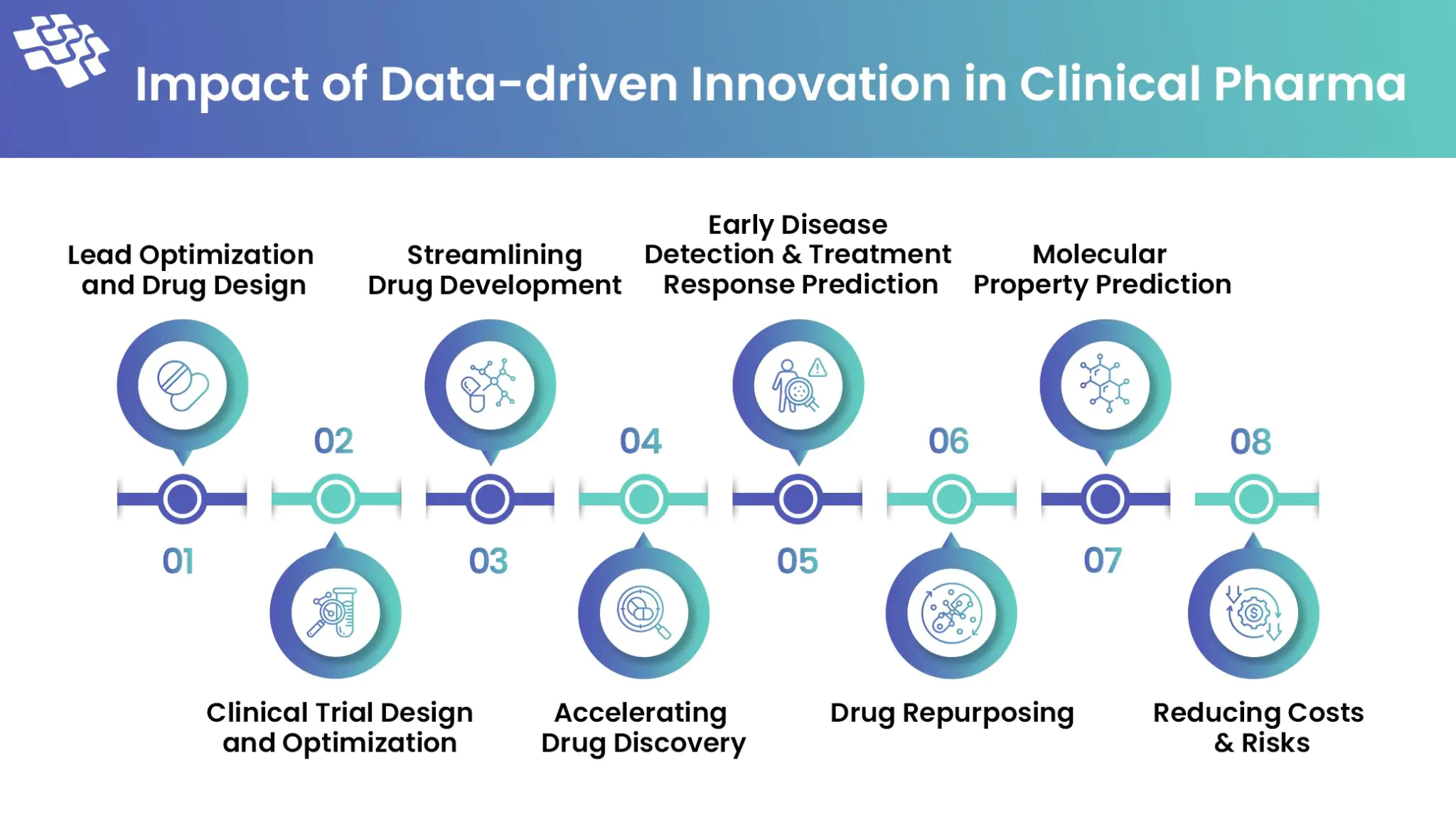
Impact of Data-driven Innovation in Clinical Pharma
The world has recently experienced a data revolution, with businesses from all sectors utilizing big data and machine learning to spur efficiency and creativity. These technologies are revolutionizing clinical pharma and conventional drug development processes, which are frequently costly and slow. Researchers can find medication candidates more rapidly and precisely by analyzing large datasets, such as genetic data and patient medical records. This raises the chances of success, lowers expenses, and expedites the discovery stage.
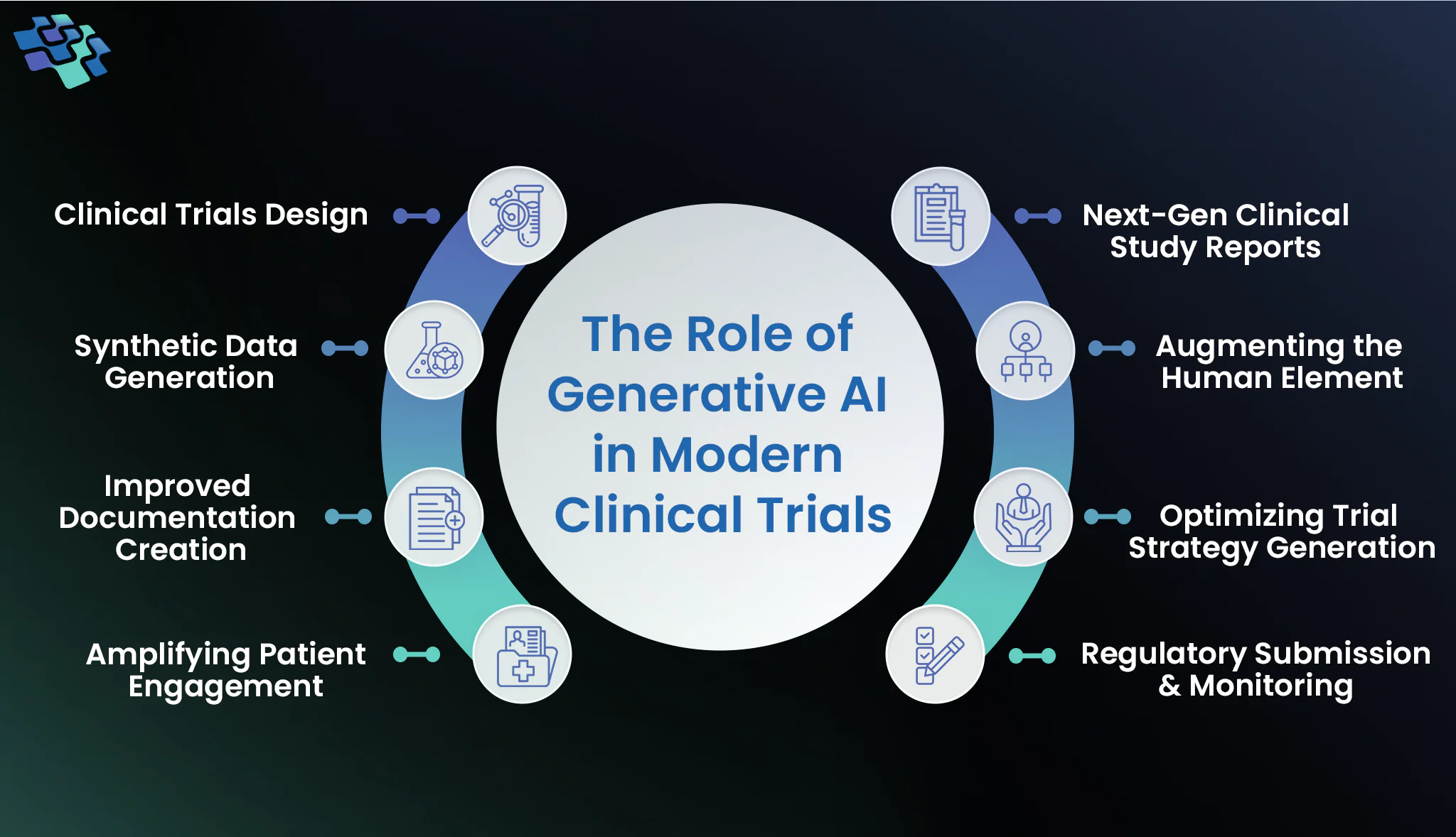
The Advancing Role of Generative AI in Clinical Trials
Generative AI in clinical trials has potential because these trials should be cost-effective, versatile, and adaptable to meet the varied objectives of different stakeholder groups. The complexities of clinical trials, which are labor-intensive, complex, and highly regulated by nature, make this more difficult in today’s challenging economic environment
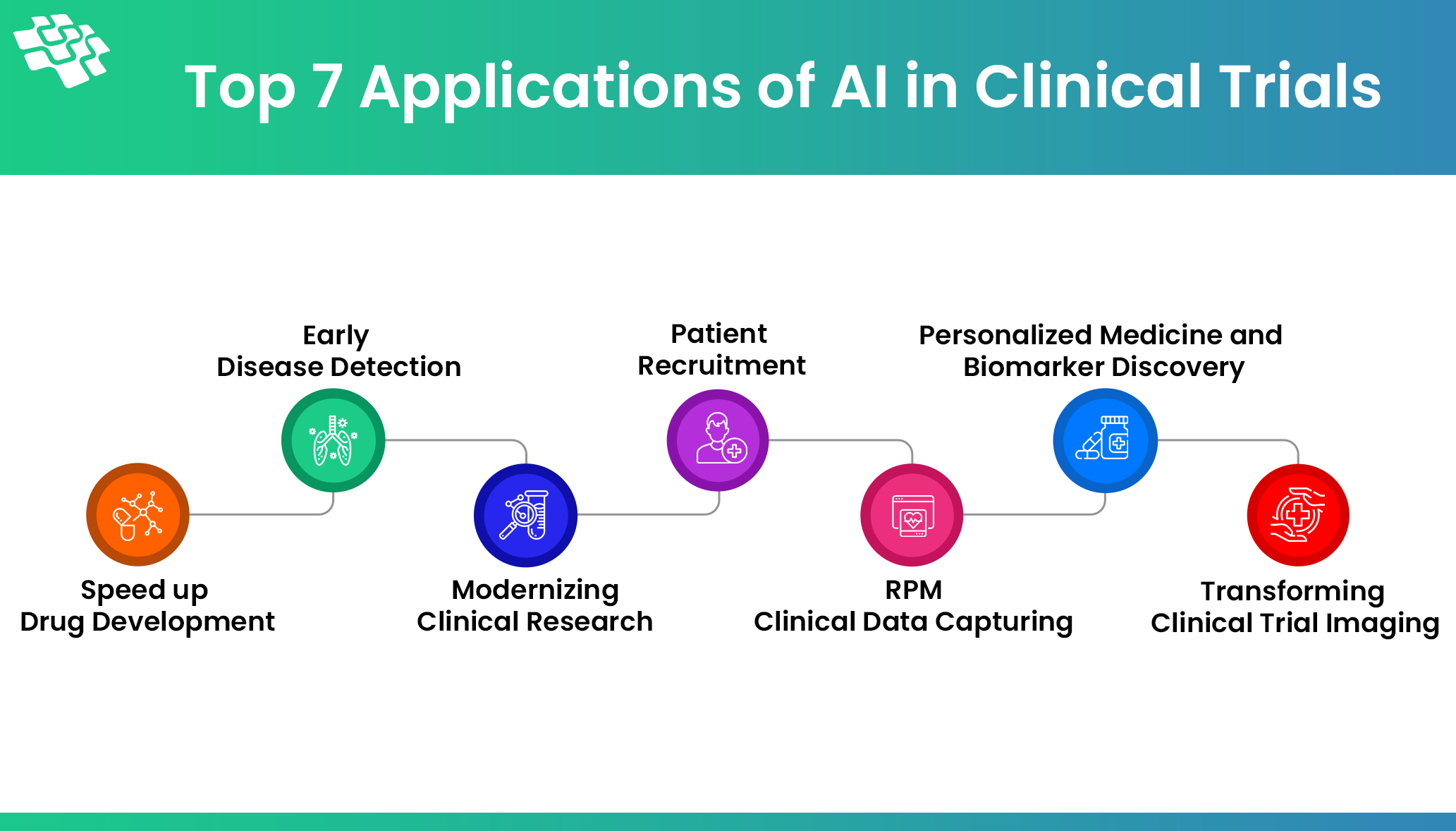
How AI in Clinical Trials is Improving Patient Outcomes?
The past year has seen a lot of coverage of AI because of its potential applications in business, logistics, technology, healthcare, and other fields. What about clinical research, though? Sponsors and clinical researchers should anticipate using AI in clinical trials. AI based software development services company have the potential to revolutionize clinical trials by streamlining and improving the patient experience.
Stay In the Know
Get Latest updates and industry insights every month.
